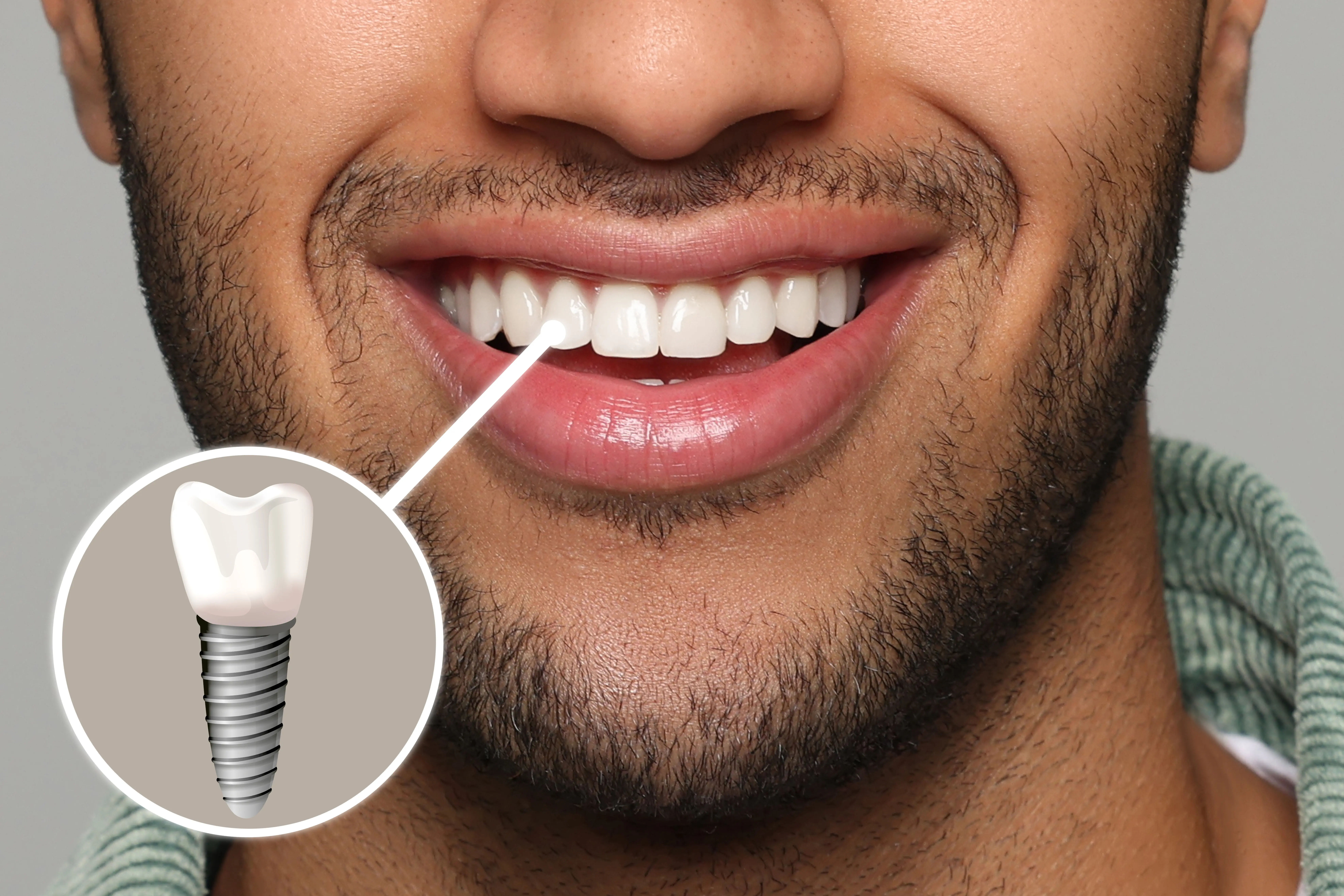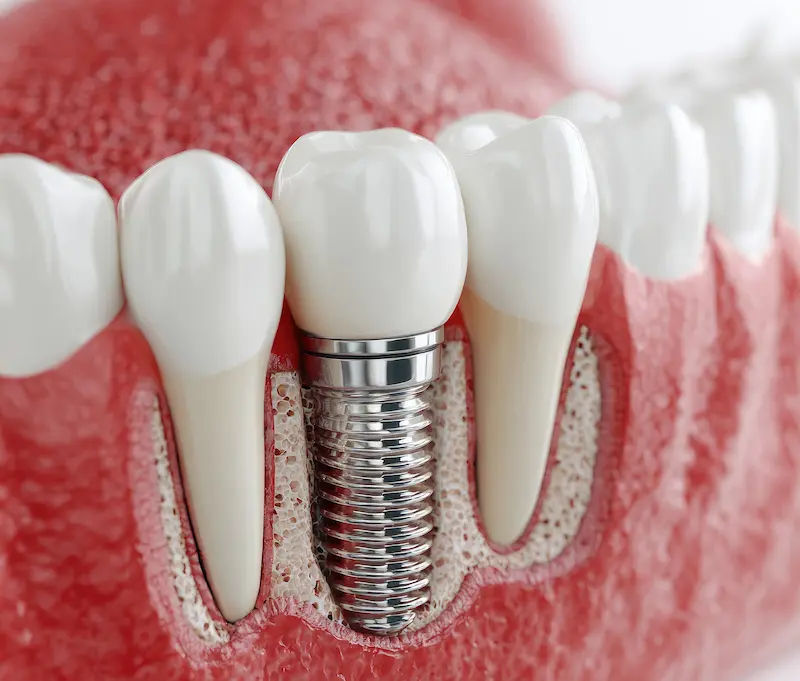Dental Implants: Your Complete Guide to a Permanent Smile
Learn everything about dental implants, from benefits and procedure to aftercare. Discover how they offer a safe, lasting solution for a confident smile.


Introduction
Losing a tooth can feel like losing a part of your confidence. It affects not just your smile but also your ability to eat and speak comfortably. For decades, the solutions were often cumbersome dentures that slip or bridges that require altering healthy teeth. But what if you could get a replacement that looks, feels, and functions exactly like your natural tooth? Enter dental implants, the modern gold standard in tooth replacement technology. More than just a cosmetic fix, a dental implant is a permanent, surgically placed foundation for a replacement tooth that integrates with your jawbone. This comprehensive guide will walk you through everything you need to know about dental implants, from the procedure and benefits to cost and recovery, empowering you to make an informed decision about reclaiming your smile and your quality of life.
What Are Dental Implants? The Modern Tooth Root Replacement
A dental implant is a small, biocompatible titanium post that serves as an artificial tooth root. It is surgically positioned into your jawbone beneath the gum line. This provides a sturdy foundation for mounting replacement teeth, known as crowns, or bridges and dentures. Unlike other solutions, implants don't rely on neighboring teeth for support, making them a standalone and highly effective long-term solution.
The Three Key Components of an Implant
1. The Implant Post: This is the screw-like titanium component that acts as the root. It fuses with your jawbone through a process called osseointegration.
2. The Abutment: This is a connector that is placed on top of the implant post after it has healed. It protrudes slightly above the gum line and serves as the base for the final crown.
3. The Crown: This is the custom-made, visible part of the tooth, usually made of porcelain or zirconia, that is attached to the abutment. It is designed to match the color, shape, and size of your natural teeth.
Consult a Dentist for the best advice
Why Choose Dental Implants? Advantages Over Other Options
The benefits of dental implants are extensive, offering improvements in function, health, and aesthetics that other options simply can't match.
- Natural Look and Feel: Implants are designed to fuse with bone, becoming permanent. They feel and function like your own teeth.
- Improved Speech: Poor-fitting dentures can slip, causing you to mumble or slur. Implants allow you to speak without worry.
- Superior Comfort: Because they become part of you, implants eliminate the discomfort of removable dentures.
- Eat with Confidence: Implants function like your own teeth, allowing you to eat your favourite foods, including crunchy and chewy items, without pain.
- Oral Health Boost: Unlike a tooth-supported bridge, implants don't require grinding down adjacent teeth. This leaves your natural teeth intact, improving long-term oral health.
- Durability: Implants are incredibly durable and, with good care, can last a lifetime. The crown may need replacement due to wear every 10-15 years.
- Bone Preservation: Tooth loss leads to jawbone deterioration. Implants are the only tooth replacement option that stimulates natural bone growth and prevents bone loss.
Implants vs. Bridges: Preserving Your Natural Teeth
A traditional bridge requires grinding down the healthy teeth adjacent to the gap to anchor the prosthetic. This permanently alters healthy tooth structure. Dental implants stand alone, preserving the integrity of your surrounding teeth.
Implants vs. Dentures: Stability and Bone Health
Dentures can slip, cause sore spots, and make eating difficult. They also accelerate bone loss in the jaw because they do not provide root stimulation. Implants provide unparalleled stability and actively prevent bone resorption, maintaining your facial structure.
Are You a Candidate for Dental Implants?
Most adults in good general and oral health are candidates for dental implants. Ideal candidates have:
- Adequate bone density in the jaw to anchor the implant.
- Healthy gum tissues free of periodontal disease.
- Good overall health to support normal healing after surgery.
- A commitment to maintaining excellent oral hygiene.
Factors That May Affect Candidacy
Smoking, uncontrolled diabetes, heart disease, a history of radiation therapy to the head/neck area, or certain medications can affect healing. However, many of these are not absolute barriers. A thorough evaluation by a dental professional is essential. If you have underlying health conditions, it's advisable to consult a doctor online with Apollo24|7 to understand how they might interact with a surgical procedure before your dental consultation.
The Dental Implant Procedure: A Step-by-Step Journey
The process of getting a dental implant requires multiple visits over several months. Understanding the dental implant procedure steps can alleviate anxiety.
Step 1: Initial Consultation and Planning
Your dentist or oral surgeon will conduct a comprehensive exam, including X-rays and 3D scans, to assess your jawbone density and plan the implant placement. This is when a customised treatment plan is created.
Step 2: The Implant Placement Surgery
Performed under local anaesthesia (and sedation if needed), the surgeon makes a small incision in the gum to expose the bone, drills a precise hole, and inserts the titanium implant post. The gum is then stitched closed over the implant.
Step 3: The Healing Period (Osseointegration)
This is the most critical phase. Over the next 3-6 months, the jawbone grows into and fuses with the surface of the implant (osseointegration), creating a solid anchor for the artificial tooth.
Step 4: Placing the Abutment and Crown
Once healed, a minor procedure is done to attach the abutment to the implant. After your gum tissue heals around this (about two weeks), impressions are taken to create your custom crown. The final crown is then cemented or screwed onto the abutment.
Understanding the Cost of Dental Implants
The cost of dental implants is higher upfront than other options, but their longevity and benefits often make them more cost-effective over time. A single tooth implant cost can vary widely.
Factors Influencing the Total Price
Number of implants needed.
- The need for additional procedures (bone grafts, sinus lifts).
- The type of implant and crown material used.
- The expertise of the dental professional.
- Geographic location of the dental practice.
Exploring Financing and Insurance Options
While many dental insurance plans do not cover the full cost, they may cover part of the procedure (e.g., the crown). Many dental practices offer payment plans or financing options to make treatment affordable.
Caring for Your New Dental Implants
Treat your implants like your natural teeth. This involves:
- Brushing twice daily and flossing around the implant crown meticulously.
- Using interdental brushes or water flossers to clean hard-to-reach areas.
- Avoiding excessively hard foods that could damage the crown.
- Scheduling regular dental check-ups and cleanings.
With proper care, the dental implant success rate is over 95% over a 10-year period, and they can last a lifetime.
Conclusion
Choosing to get a dental implant is an investment in your health, confidence, and quality of life. It’s a decision that goes beyond aesthetics, offering a functional, durable, and natural-looking solution to tooth loss. By understanding the process, benefits, and commitment involved, you can approach the journey with confidence. If you are considering dental implants, the first and most important step is to consult with a qualified dentist or oral surgeon. They can provide a personalised assessment, answer all your questions, and create a treatment plan tailored to your unique smile. Don't let missing teeth hold you back; explore how implants can help you get your fixed teeth back and enjoy a complete, healthy smile for years to come.
Consult a Dentist for the best advice
Consult a Dentist for the best advice

Dr Gaurav Jain
Oral and Maxillofacial Surgeon
21 Years • BDS, MDS
Delhi
Apollo Hospitals Indraprastha, Delhi

Dr. Debarati Deb
Dentist
10 Years • BDS, MDS Oral Medicine and Radiology
Kolkata
Dr. Smile Multispeciality Dental Clinic, Kolkata

Dr. Aritra Mandal
Dentist
6 Years • BDS, MDS (PERIODONTOLOGY)
Kolkata
COSMI DENTAL, Kolkata

Dr. Gourab Paul
Oral and Maxillofacial Surgeon
5 Years • BDS,MDS(ORAL AND MAXILLOFACIAL SURGERY)
Kolkata
SOLACE OF SOULS(SOS) HEALTH CARE, Kolkata
(50+ Patients)
Dr. Smita Rani Satpathy
Dentist
5 Years • BDS
Bhubaneswar
INNOVATIVE SMILE, Bhubaneswar
Consult a Dentist for the best advice

Dr Gaurav Jain
Oral and Maxillofacial Surgeon
21 Years • BDS, MDS
Delhi
Apollo Hospitals Indraprastha, Delhi

Dr. Debarati Deb
Dentist
10 Years • BDS, MDS Oral Medicine and Radiology
Kolkata
Dr. Smile Multispeciality Dental Clinic, Kolkata

Dr. Aritra Mandal
Dentist
6 Years • BDS, MDS (PERIODONTOLOGY)
Kolkata
COSMI DENTAL, Kolkata

Dr. Gourab Paul
Oral and Maxillofacial Surgeon
5 Years • BDS,MDS(ORAL AND MAXILLOFACIAL SURGERY)
Kolkata
SOLACE OF SOULS(SOS) HEALTH CARE, Kolkata
(50+ Patients)
Dr. Smita Rani Satpathy
Dentist
5 Years • BDS
Bhubaneswar
INNOVATIVE SMILE, Bhubaneswar
More articles from Dental Implants
Frequently Asked Questions
How long does the entire dental implant process take?
The entire process, from implant placement to attaching the final crown, typically takes between 3 to 9 months. The timeline largely depends on the need for bone grafting and the speed of your healing and osseointegration.
Is the dental implant procedure painful?
The surgery itself is performed under local anesthesia, so you should not feel pain during the procedure. Post-surgery, it's common to experience some discomfort, swelling, or bruising, which can be managed effectively with over-the-counter pain medication or prescribed analgesics.
Can dental implants fail?
While the dental implant success rate is very high (95-98%), failures can occur. The most common reasons are infection, failure to osseointegrate (often due to smoking or poor bone quality), or excessive pressure on the implant soon after placement. Good oral hygiene and following your dentist's instructions are key to success.
How long do dental implants last?
With proper care and maintenance, the titanium implant post itself can last a lifetime. The dental crown attached to it may need to be replaced due to normal wear and tear every 10 to 15 years.
What are mini dental implants?
Mini dental implants (MDIs) have a smaller diameter than traditional implants. They are primarily used to stabilise a lower denture for patients who may not have enough bone mass for standard implants or are looking for a less invasive, often more affordable, option. However, they are not suitable for all cases.


